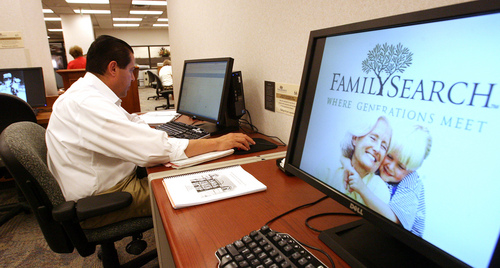This is an archived article that was published on sltrib.com in 2013, and information in the article may be outdated. It is provided only for personal research purposes and may not be reprinted.
Not that many years ago, it seemed the only people doing genealogy work were Mormons.
In recent years, it's become increasingly popular. A bit of a fad for some. The subject of intense interest for many people. And the subject of a new series on PBS.
Following in the footsteps of "Antiques Roadshow" — which it follows on the PBS schedule — "Genealogy Roadshow" debuts on Monday.
There is an obvious difference between the two. In the former, people show up with items they want appraised; in the latter, it's less random. PBS stations solicited genealogy questions and researched them before putting anyone on TV.
"These are very specific questions," said executive producer Stuart Krasnow. "It's not just, 'Oh, tell me everything about my roots, where I came from.' It's really, 'We want to know if we are related to Abraham Lincoln,' for instance."
At that point, researchers and DNA experts go to work to prove or disprove family lore. "And then the stories that have, sort of, the most interesting results are the ones that we feature on the show," Krasnow said.
In Monday's premiere, people who think they're related to George Washington, Davey Crockett or Jesse James learn whether they actually are. Or whether they're related to the famously feuding Hatfield clan. Or find out the facts behind a family photo.
Or, in one case, a young woman learns about the father she never met.
All this happens as an audience "oooohs" and "aaaahs," laughs and cries as the results of the research are revealed. The links to people's past. The good news and the bad.
"It's amazing seeing the crowd be so invested," Krasnow said, "because [the investigations] are really a mystery story and you get a lot of 'aha' moments."
And the DNA tests give people an idea where they came from — and where they didn't come from.
"We constantly get folks that think that they have Native American ancestry," said researcher Kenyatta Berry, president of the Association of Professional Genealogists. "That is the most popular thing in genealogy."
"We have a couple of those moments on the show where you have to stand in front of someone whose family has told a story for two or three generations and you break the news that, well, actually the DNA says that that isn't correct," said Joshua Taylor.
There's plenty of old-fashioned research involved, too. And some of that takes place right here in Salt Lake City, which Berry called "the Mecca of genealogy."
"We all go there. We love it," Berry said. "The [LDS Family History] Library is huge, and there's people there that will help you. … They've always been very supportive of what we do, and they've also really wanted to make sure people have access to those records."
Taylor was equally enthusiastic.
"The Mormon Church has really done a gift for family history," he said, pointing to all the work that's been done copying birth and death records from around the world.
"I went to New Zealand last week, and they were talking about Christchurch and how the records were destroyed. And it's the Mormons who gave the records back to those communities because they'd microfilmed them," he said. "And we, as genealogists, can tap into that same record set and do research for 'Genealogy Roadshow.' "
'Genealogy Roadshow'
The series premieres Monday, Sept. 23, at 8 p.m. on PBS/Channel 7.



